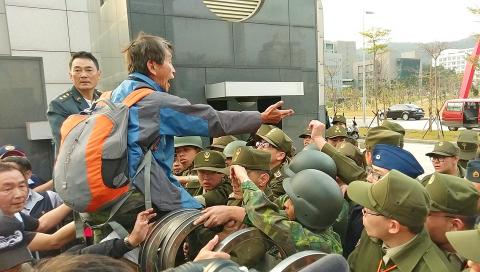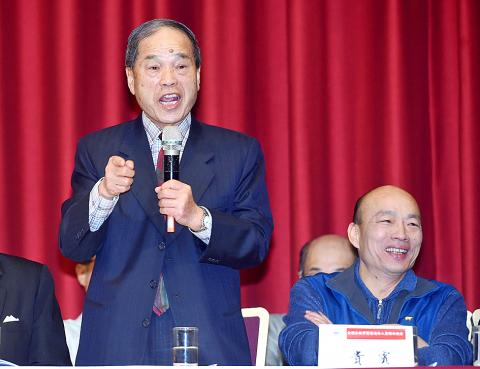Chinese Nationalist Party (KMT) politicians yesterday played down comments by KMT official Chen Keng-chin (陳庚金), who called on public servants to “goof around as much as possible and milk their jobs for all they are worth” to “drag down the government.”
Chen, who heads the party’s Evaluation and Discipline Committee, on Wednesday told the general assembly of the Association of Retired Public Servants, Teachers, Military and Police of the Republic of China that “public officials, farmers, artisans and merchants” are essentially different and there is no possibility of “absolute equality” among them.
He compared the government’s pension reform to China under Mao Zedong (毛澤東) and called on the audience to “overthrow” a government that would “manufacture that kind of class struggle.”

Photo: Fang Pin-chao, Taipei Times
Chen said that as “actions speak louder than words, we should tell military personnel, public servants and teachers to stand with us and goof around as much as possible and milk their jobs for all they are worth.”
“Let’s drag down this government,” said Chen, a former presidential adviser and former head of the Personnel Administration Bureau.
KMT Vice Chairman and association chairman Jason Hu (胡志強) spoke after Chen, saying: “Our [former] presidential adviser’s words are impassioned and meaningful.”

Photo: Liao Chen-huei, Taipei Times
KMT Vice Chairman Hau Lung-bin (郝龍斌), who is vying for the chairperson position, told the convention that if elected, he would follow the association’s lead to fight Democratic Progressive Party (DPP) pension reforms.
Hau said yesterday that he did not hear Chen’s speech.
However, he said that the DPP administration’s policies — not just pension reform, but others such as labor reform and a proposal to lift restrictions on Japanese prefectures hit with a ban on importing foodstuffs after the meltdown at the Fukushima Dai-ichi nuclear plant — have stirred public discontent.
Hu wrote on Facebook that he “certainly does not support the idea of public servants goofing around,” and said that Chen was “joking.”
KMT caucus secretary-general Lin Wei-chou (林為洲) said he suspects that Chen’s remarks were “emotional words uttered off the top of his head.”
It was out of bitterness sparked by the government’s change of mind over paying pensions to retired officials as promised, Lin said.
However, public officials are bound by laws and would be fired if they “goof around” too much, Lin said, calling for rational discussion.
Chen and Hu are beneficiaries of the current pension system after their years of service with the KMT and as public officials, DPP Legislator Lee Chun-yi (李俊俋) said, adding that they will therefore be affected by pension reform.
Lee called on the KMT to propose its own pension reform plan before the legislature starts reviewing the government’s proposals.
The KMT could propose to keep pensions for retirees and cut benefits for public servants in the workforce today, or it could propose safeguarding the practice of combining service years at the KMT and government agencies and see if the people accept that, Lee said with apparent sarcasm.
Presidential Office spokesperson Alex Huang (黃重諺) said that the goal of pension reform is to guarantee that every Taiwanese can retire with financial security, while allowing the state’s limited resources to be fairly and sustainably distributed.
“I think [Chen’s] remarks are not worth commenting on,” Huang said.
“We are surprised that this kind of statement came from a senior former official who once headed the Department of Personnel Administration,” he said.
“No one would believe that Chen’s words represent military personnel, public servants and teachers who are diligently serving the country,” Huang said.
Additional reporting by Wang Jie, Tseng Wei-chen and CNA

SECURITY: As China is ‘reshaping’ Hong Kong’s population, Taiwan must raise the eligibility threshold for applications from Hong Kongers, Chiu Chui-cheng said When Hong Kong and Macau citizens apply for residency in Taiwan, it would be under a new category that includes a “national security observation period,” Mainland Affairs Council (MAC) Minister Chiu Chui-cheng (邱垂正) said yesterday. President William Lai (賴清德) on March 13 announced 17 strategies to counter China’s aggression toward Taiwan, including incorporating national security considerations into the review process for residency applications from Hong Kong and Macau citizens. The situation in Hong Kong is constantly changing, Chiu said to media yesterday on the sidelines of the Taipei Technology Run hosted by the Taipei Neihu Technology Park Development Association. With

CARROT AND STICK: While unrelenting in its military threats, China attracted nearly 40,000 Taiwanese to over 400 business events last year Nearly 40,000 Taiwanese last year joined industry events in China, such as conferences and trade fairs, supported by the Chinese government, a study showed yesterday, as Beijing ramps up a charm offensive toward Taipei alongside military pressure. China has long taken a carrot-and-stick approach to Taiwan, threatening it with the prospect of military action while reaching out to those it believes are amenable to Beijing’s point of view. Taiwanese security officials are wary of what they see as Beijing’s influence campaigns to sway public opinion after Taipei and Beijing gradually resumed travel links halted by the COVID-19 pandemic, but the scale of

A US Marine Corps regiment equipped with Naval Strike Missiles (NSM) is set to participate in the upcoming Balikatan 25 exercise in the Luzon Strait, marking the system’s first-ever deployment in the Philippines. US and Philippine officials have separately confirmed that the Navy Marine Expeditionary Ship Interdiction System (NMESIS) — the mobile launch platform for the Naval Strike Missile — would take part in the joint exercise. The missiles are being deployed to “a strategic first island chain chokepoint” in the waters between Taiwan proper and the Philippines, US-based Naval News reported. “The Luzon Strait and Bashi Channel represent a critical access

Pope Francis is be laid to rest on Saturday after lying in state for three days in St Peter’s Basilica, where the faithful are expected to flock to pay their respects to history’s first Latin American pontiff. The cardinals met yesterday in the Vatican’s synod hall to chart the next steps before a conclave begins to choose Francis’ successor, as condolences poured in from around the world. According to current norms, the conclave must begin between May 5 and 10. The cardinals set the funeral for Saturday at 10am in St Peter’s Square, to be celebrated by the dean of the College